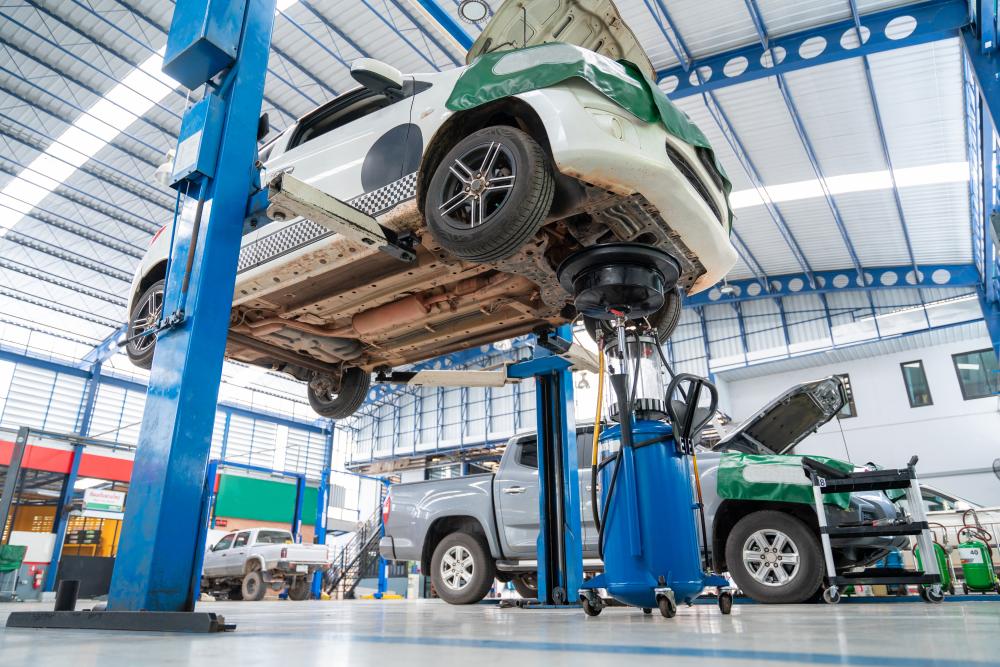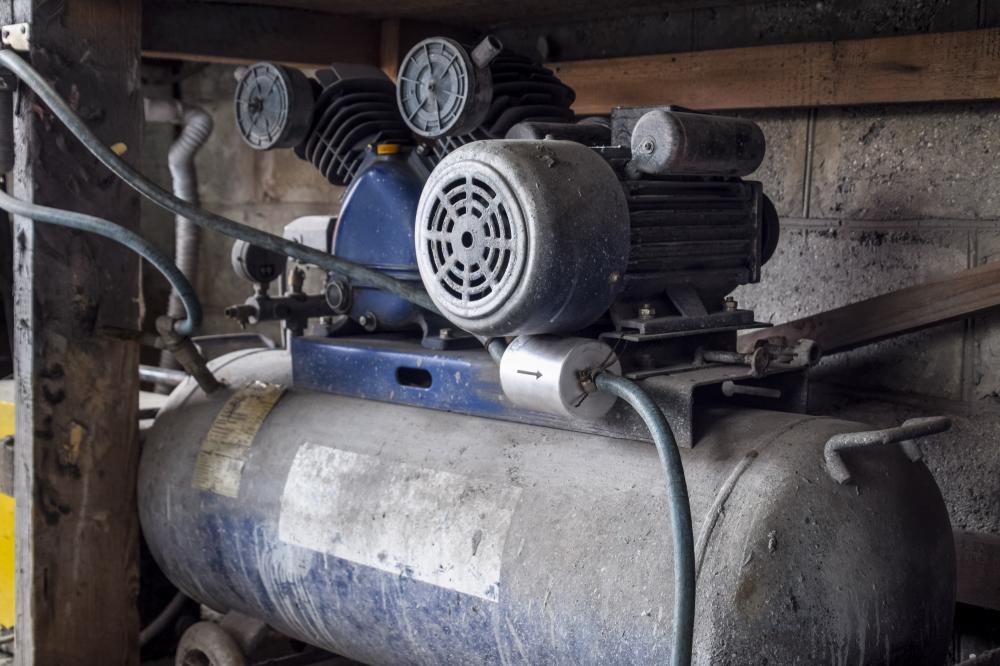
Understanding Auto Shop Air Solutions
Auto Shop Air Solutions are a backbone for maintaining efficiency and precision in automotive repair and service centers. From our decades of experience at Excel Tire Gauge, we’ve observed firsthand how pivotal proper air management systems are to the operation of auto shops. These solutions, encompassing air compressors, piping kits, and automatic tire inflators, stand at the core of daily operations, ensuring that tools run smoothly and tires are inflated to exact specifications for safety and performance.
Choosing the right Auto Shop Air Solutions is not just about purchasing equipment; it’s about integrating a system that aligns with your operational needs and size. For smaller shops, a basic setup with a compact, efficient compressor and essential air distribution kits could suffice. In contrast, larger facilities may benefit from more comprehensive solutions featuring high-capacity compressors and advanced air management systems to support multiple workstations simultaneously.
Key Components of Auto Shop Air Solutions
Compressors and Piping
The heart of any Auto Shop Air Solution is the air compressor. Our SC09-SS Pay Air Machine and PNT 4 for outdoor use are designed to offer reliability and efficiency, catering to various industry needs. Alongside a durable compressor, the installation of proper piping is crucial. It ensures an optimized flow of compressed air, minimizing leaks and maintaining pressure integrity throughout the system. Solutions like our SCWM-23 Wall Air Machine exemplify the importance of integrating quality infrastructure to prevent energy loss and deliver performance.
Automatic Tire Inflators
Automatic tire inflators, such as our PNT PRO, provide precision inflation, crucial for maximizing tire life and vehicle fuel efficiency. In the bustling environment of auto shops, the ability to quickly and accurately adjust tire pressure directly impacts service quality and customer satisfaction. These devices not only streamline operations but also enforce safety standards by ensuring tires are inflated to the manufacturer’s recommended levels.
Tailoring Solutions to Your Needs
At Excel Tire Gauge, we understand that every auto shop has unique needs. Whether you’re outfitting a new facility or upgrading an existing one, assessing your specific requirements is the first step. Consider factors such as the size of the facility, the volume of vehicles serviced, and the types of services offered. This assessment will guide you in selecting a system that not only meets your current needs but also accommodates future growth.
We offer a range of programs, including a Revenue Share Program and a Rental Program, to provide flexibility in how our customers can access our top-rated air equipment. Our commitment is to deliver solutions that enhance operational efficiency, reduce energy consumption, and elevate service quality.
Advantages of Choosing the Right System
Investing in the right Auto Shop Air Solutions brings a multitude of benefits. High-quality air systems reduce downtime by preventing equipment failures and ensuring tools operate at peak performance. This reliability translates into faster, more efficient service delivery and, ultimately, higher customer satisfaction. Additionally, energy-efficient solutions not only lower operational costs but also contribute to environmental sustainability.
Personal insights from our work with industry leaders, like Costco and Melvin’s Tire Pros, underscore the impact of well-chosen air solutions. These partnerships have led to notable improvements in productivity, accuracy in tire calibration, and an enhanced overall service experience for customers. The right system not only supports your business’s operational needs but also boosts its reputation by consistently delivering on service promises.
- SC09-SS Pay Air Machine – Ideal for high-volume, commercial use
- SC05-SS Free Air Machine – Perfect for smaller shops or as an additional unit
- SCWM-23 Wall Air Machine – A versatile solution for space-limited areas
- PNT PRO – Indoor automatic tire inflator for precision service
- PNT 4 – Robust outdoor tire inflator designed to withstand the elements
In conclusion, by aligning with Excel Tire Gauge for your Auto Shop Air Solutions, you’re choosing a partner committed to innovation, quality, and service excellence. Our goal is to help you optimize your operations, ensuring that every customer leaves your shop with their vehicle performing at its best.

Choosing the Right Air Compressor for Auto Shop
When it comes to selecting an Air Compressor for Auto Shop, understanding your shop’s needs is paramount. As a leader in digital air inflation solutions, Excel Tire Gauge has insights into the pivotal role that air compressors play in automotive maintenance and repair. An Air Compressor for Auto Shop not only needs to meet the power requirements of various tools but also be energy-efficient to optimize operational costs.
In our experience, electric air compressors are a staple for auto shops with a consistent power source. They offer reliability for everyday use. For those requiring mobility or operating in areas without direct electrical access, a gas-powered compressor becomes indispensable. This dichotomy in compressor types addresses diverse operational needs within auto maintenance facilities.
Size and power are critical considerations. A compressor that’s too small won’t keep up with demand, while an overly large one wastes energy. For most auto shops, a model providing between 15 to 28 CFM at 100 PSI suffices, balancing power and efficiency. However, requirements might vary based on the number and type of tools used simultaneously. Remember, it’s about finding that sweet spot where capacity meets demand without overshooting energy consumption.
Innovative Solutions and Personal Experiences
At Excel Tire Gauge, we’ve innovated in the realm of air compressors by focusing on automation and energy efficiency. Our journey into creating leading-edge air machines and automatic tire inflators has shown us the profound impact of precision. An Air Compressor for Auto Shop isn’t just about power; it’s about delivering the right amount of air, at the right pressure, precisely when and where it’s needed. This approach reduces wear on tools and can lead to significant savings over time.
From conversations with clients like Costco and Melvin’s Tire Pros, it’s clear that the right air compressor can dramatically streamline workflow. For instance, an auto shop using one of our digital inflators reported a noticeable reduction in operational times and a boost in customer satisfaction. There’s an undeniable value in reliability and accuracy that extends beyond the shop floor to the end user. It’s about creating a seamless experience that enhances efficiency and trust.
Our range of air compressors caters to various needs, from the SC09-SS Pay Air Machine designed for high-traffic areas to the SC05-SS Free Air Machine offering cost-effective solutions for smaller shops. Each model is built with a focus on longevity and ease of use, ensuring that auto shops can provide reliable service without frequent downtimes or complicated maintenance routines.
Choosing an Air Compressor for Auto Shop involves more than just picking a model. It’s about considering how the compressor integrates into your workflow, affects your energy consumption, and ultimately, contributes to customer satisfaction. Our range of products is designed with these considerations in mind, ensuring that every auto shop can find an air solution that truly fits its needs.
Additional Considerations for Selection
- Look for compressors with ASME-approved tanks, ensuring safety and reliability.
- Consider oil-lubricated models for their longevity and quieter operation.
- Assess accessories like air dryers and low oil level switches for enhanced performance.
- Don’t overlook the importance of a reputable manufacturer’s warranty and customer support.
- Understand your shop’s specific needs by evaluating the tools powered by the compressor and considering future expansion.
Understanding Gas Air Compressors
In the realm of pneumatic tools and applications, the gas air compressor stands out as a versatile and powerful ally. Excel Tire Gauge, as a frontrunner in air inflation technology, appreciates the significance of a reliable gas air compressor in facilitating work efficiency and precision in various industries. Unlike their electric counterparts, gas air compressors do not tether you to a power outlet, offering unparalleled mobility and flexibility on job sites.
Gas air compressors function by harnessing fuel to drive an engine, which in turn operates the compressor mechanism to intake air, compress it, and store it in a tank for use. This process is instrumental in a myriad of applications, from powering pneumatic tools for construction and automotive repair to inflating tires with accuracy and speed. Their utility in remote or undeveloped locations where electricity is scarce underpins the technology’s crucial role in modern industry.
Excel Tire Gauge’s dedication towards efficiency and energy-saving solutions parallels the evolution of gas air compressors. These machines are increasingly becoming more fuel-efficient and quieter, without sacrificing power or performance. It is these technological advances that make gas-powered compressors indispensable to professionals and enthusiasts alike.
Choosing the Right Gas Air Compressor
Selecting the ideal gas air compressor can seem daunting, given the plethora of options available. However, understanding your requirements can significantly narrow down the choices. Factors such as portability, power output (measured in horsepower or HP), tank size, and CFM (cubic feet per minute) rating crucially affect the compressor’s suitability for specific tasks.
Portability and Power:
For those constantly on the move, such as mobile repair services, a portable gas air compressor with a high HP rating provides the necessary power for demanding tools while ensuring mobility. Conversely, stationary setups, like those in garages or factories, can benefit from larger tank sizes and higher CFM ratings, allowing for continuous use of tools without pressure drops.
Tank Size and CFM Rating:
The tank size directly relates to how much compressed air is available before the unit needs to restart its compression cycle. Meanwhile, the CFM rating is an indicator of the compressor’s ability to power air tools continuously. Higher CFM ratings support more extensive or multiple tool usage simultaneously, highlighting the importance of matching the compressor with the tools’ requirements.
In our experience at Excel Tire Gauge, where precision and efficiency are paramount, choosing a gas air compressor that marries well with your operational demands not only enhances productivity but also extends the lifespan of both the compressor and air-powered tools. Personal anecdotes from clients who have navigated these decisions with our guidance echo the sentiment that understanding these key factors has been instrumental in optimizing their workflows and service offerings.
Innovation and Sustainability in Gas Air Compressors
At Excel Tire Gauge, our commitment to innovation and environmental stewardship informs our perspective on the future of gas air compressors. The industry is witnessing exciting developments in making these units more fuel-efficient, thereby reducing the carbon footprint associated with their operation. Advances such as variable speed engines and improved fuel injection systems are paving the way for more sustainable, yet potent, compressors.
Moreover, the emergence of biodegradable lubricants and the push for engines compatible with alternative fuels reflect a growing consciousness towards eco-friendly practices. These trends not only align with Excel Tire Gauge’s initiative to promote energy-efficient solutions but also offer a glimpse into the future where gas air compressors continue to play a vital role in industry and craftsmanship, albeit with a lighter environmental impact.
Integration of modern technology also enhances the operational efficiency of gas air compressors. Features like digital control panels for precise pressure adjustments and maintenance alerts contribute to a user-friendly experience and prolong the equipment’s service life. Customizations and enhancements based on user feedback and technological advancements are at the heart of what makes gas air compressors an indispensable tool across various sectors.
In the quest for excellence and sustainability, embracing these innovations not only bolsters performance but also mirrors Excel Tire Gauge’s ethos of delivering quality and environmentally conscious air inflation solutions. By investing in state-of-the-art gas air compressors, our clients not only streamline their operations but also contribute to a greener planet.

What size air compressor do you need for a mechanic shop?
Choosing the right size air compressor for a mechanic shop hinges on several key factors, including the types of tools you’ll be using, the number of tools operated simultaneously, and the shop’s overall demand for air. Typically, for most mechanic shops, an air compressor providing between 15 to 28 CFM (cubic feet per minute) at 100 PSI (pounds per square inch) strikes a good balance between power and efficiency. However, it’s not just about picking any compressor within this range. You need to assess your specific needs carefully.
Let’s say you mainly handle light-duty tasks; a smaller, more compact unit might suffice. But if your shop frequently performs heavy-duty tasks requiring high-volume air tools, you’ll need a compressor with a larger tank and higher CFM rating to avoid any operational hiccups. I always suggest creating a list of all the pneumatic tools you use, noting their air consumption rates, and then adding a margin to accommodate future tools or increased demand. This approach ensures you won’t find yourself with an underpowered system a year down the line. And remember, it’s not just about the immediate cost. An investment in the right air compressor reduces energy consumption and maintenance costs over time.
Have you considered how future expansions of your shop might affect your air compressor needs?
What is shop air?
Shop air refers to the compressed air used in various industries, including automotive repair shops, to power a wide range of pneumatic tools and machinery. This compressed air is generated by air compressors that intake atmospheric air, compress it, and then store it in a tank until it’s needed. The magic of shop air lies not just in its ability to power tools but in its versatility and efficiency.
In the context of auto shops, shop air powers essential tools from impact wrenches to tire inflators. This air is clean, readily available, and incredibly efficient, making it the lifeblood of any mechanic’s workshop. But it’s not without its challenges. Proper air management systems are crucial to ensure that this compressed air is delivered at the right pressure and volume, without leaks or energy loss. That’s where solutions like air piping kits and automatic tire inflators come into play, ensuring tools run smoothly and operations are efficient.
Do you know if your current air management system is optimized for your shop’s specific needs?
Advantages of Automatic Tire Inflators
Automatic tire inflators represent a leap in efficiency and accuracy for auto shops. These nifty devices automate the tire inflation process, ensuring that tires are inflated to the manufacturer’s recommended level with precision. The benefits here are twofold: Firstly, proper inflation maximizes tire life and vehicle fuel efficiency, directly impacting customer satisfaction and loyalty. Secondly, it streamlines workflows in busy shops. Imagine slashing the time it takes to manually check and inflate tires without sacrificing – in fact, improving – accuracy.
Our experience with leading retailers like Costco and tire pros like Melvin’s has shown time and again that the adoption of automatic tire inflators can significantly boost service efficiency. They reduce manual errors and ensure consistent service quality. Not to mention, these devices also play a crucial role in safety by ensuring tires are appropriately inflated, thereby reducing the risk of accidents due to underinflated tires.
How could an upgrade to automatic tire inflators streamline operations in your workshop?
Choosing the Right Gas Air Compressor
When it comes to selecting the perfect gas air compressor for your needs, understanding the balance between portability, power, and capacity is key. Gas air compressors are invaluable for their flexibility and mobility, especially in locations without direct electrical access or for tasks requiring relocation of the compressor. However, the variety of options available can be overwhelming.
Portability and power output should be your primary considerations if your operations involve moving around, such as on-site repairs or construction. A unit with a high horsepower (HP) rating that’s also light enough to transport can provide the robust performance needed without being tethered to one spot. On the other hand, for stationary setups in shops or factories, focusing on tank size and CFM rating becomes more important. Larger tanks and higher CFM ratings support continuous use of multiple tools without pressure drops.
I recommend conducting a thorough assessment of your operational needs, considering the types of tools you use, their air consumption, and your mobility needs. From there, aligning with a model that supports your workflow can significantly enhance productivity and extend the lifespan of your tools. It’s about finding that sweet spot where your operational demands meet the compressor’s capabilities.
Are you currently maximizing the efficiency of gas air compressors in your operations?
Resources
- Environmental Protection Agency (EPA) – The EPA provides information on environmental regulations and standards that may impact the operation of auto shops.
- Occupational Safety and Health Administration (OSHA) – OSHA offers guidelines and resources for maintaining a safe working environment in auto repair shops.
- U.S. Department of Energy – The Department of Energy has information on energy-efficient practices and resources for businesses, including auto shops.
- National Highway Traffic Safety Administration (NHTSA) – The NHTSA provides resources on tire safety and regulations that auto shops must adhere to.
- Food and Drug Administration (FDA) – The FDA offers information on air quality standards and regulations that may apply to auto shop air solutions.